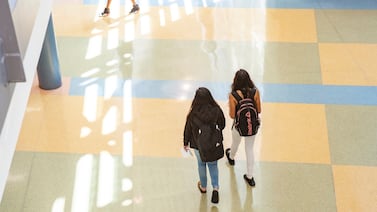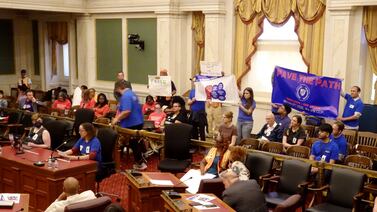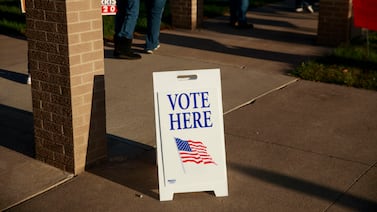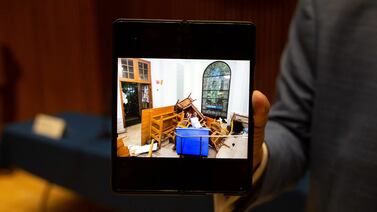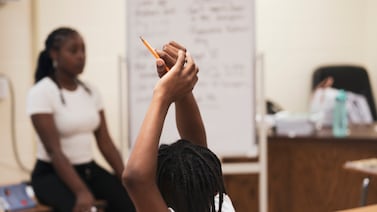Jennifer and Jamin Alabiso proposed what they thought was an innovative way for their 10-year-old son, who has autism, to receive special education services during remote learning — specifically, the 45 minutes per day of reading help he needs to reach grade level.
The family lives less than a block from his Denver school, and teachers had already been by the house several times to drop off supplies. Would it be possible for the special education teacher to sit with their son outside on the front porch, masks on, for his reading lessons? If not on the front porch, then maybe on the school playground? Or even inside an empty classroom?
The school said no to the idea. At the time, all Denver students were set to start the school year remotely because district officials deemed classroom learning unsafe due to COVID-19. The Alabisos were told their son’s school couldn’t make an exception for him.
“Reading is hard for him,” said his father, Jamin. During remote learning, when the teacher asks his son to read, “he can just escape. That’s why you need to be in person — because he can’t turn you off. He can’t walk away from you. He can’t close the top of his Chromebook.”
Frustrated, the family filed a complaint in August with the Colorado Department of Education, alleging the district was denying their son a “free and appropriate public education” as guaranteed by law. Denver Public Schools responded, arguing it had done nothing wrong.
Late last month, the state ruled mostly in favor of Denver Public Schools. The Alabisos’ son would continue to learn remotely. But two weeks later, the district changed its mind.
Starting Monday, the 10-year-old will do his remote learning mostly at school.
The Alabisos are baffled by the reversal. The official reason cited by the school is that their son “shows a high amount of refusals to complete academic work” during remote learning, which is what the Alabisos had been saying all along.
“It’s not even clear to me we did X, Y, and Z and we got this,” said Jennifer, who along with her husband spoke about their son’s case with several school board members and with Chalkbeat. “My hope is that other families read this and they don’t feel alone and they feel empowered to push the district if they’re not getting the services that their children need.”
The case is an example of how hard families sometimes have to fight to secure special education services for their children.
‘He’s falling behind’
The Alabisos’ son is in fifth grade and has attended the same elementary school since kindergarten. After their request for in-person reading help was denied in August, they watched as the school held an outdoor ice cream social with all of the students, families, and staff — arguably a much riskier event than what they were proposing.
Their frustration grew as the district opened classrooms across the city to offer child care during remote learning. The Alabisos stood by as in-person learning resumed for preschoolers, then kindergarteners, then first and second graders, while their son remained at home.
By mid-October, all elementary students were back in classrooms, including their son. But it was short-lived. Rising COVID-19 cases caused the district to send students home to learn.
Nearly all Denver students are once again learning online, except for select groups who officials say struggle the most with remote learning. That includes students with disabilities who attend special education center programs. But it doesn’t include those like the Alabisos’ son who attend their neighborhood school, even though the district has said that model is superior.
“Nobody is making any decisions or taking any actions whatsoever to prioritize these kids,” Jennifer said. “Our concern is he’s falling behind.”
The Alabisos aren’t alone. Advocates have heard from scores of parents of children with special needs who express the same concern — and in some ways, that concern is growing.
In the spring, most remote learning was asynchronous, meaning students could complete their assignments whenever they liked. But in an attempt to make online learning more robust, the district now requires students to be on video calls with their teachers several hours a day.
“The families we’re hearing from say the remote learning platform doesn’t have meaning for their child,” said Pam Bisceglia, executive director of Advocacy Denver, an organization that advocates for students with disabilities. “We’re also hearing from families where the structure of the school day is overwhelming for the student.”
District data backs this up. While overall student attendance in September and October hovered around 88%, district data shows attendance among students with disabilities who have individualized education programs, or IEPs, was 83%.
Contingency plan
In their complaint, the Alabisos asked that the district be ordered to provide their son with 45 minutes of daily non-virtual reading instruction, monitor his progress, and make up for any lost learning. Like many students with disabilities, their son has an IEP that lays out his goals for the year. Since the pandemic started, the district has created “contingency plans” — which are essentially modified IEPs — to work on students’ goals during remote learning.
The Alabisos’ son’s contingency plan calls for 30 minutes per day of virtual reading help in a small-group setting — less than he would be getting under normal circumstances.
“The district submits that [the student’s contingency plans] for the spring and fall of 2020 were and are tailored to meet [his] unique literacy needs to the greatest extent possible during the COVID-19 pandemic,” the district wrote in its response.
But his parents say the plan isn’t serving him well. Case documents note that the 10-year-old made progress on his reading goal last spring, but did not make progress on his writing goal, which was to write a paragraph. His parents agree about the writing, but disagree that he made progress in reading; a test this fall revealed he’s reading at a second-grade level, they said.
“He’s not receiving the virtual learning,” Jennifer said.
“He walks away from aversive demands,” Jamin said. Sometimes, he walks away to play LEGOs. Their son has an engineering mind and loves to build. Other times, he falls asleep.
In its decision, the Colorado Department of Education found that while Denver Public Schools made some errors in revising the Alabisos’ son’s IEP, and failed to properly monitor his progress, those violations did not rise to the level of denying the fifth grader a free and appropriate public education as guaranteed by law.
The Alabisos were disappointed.
“It just feels like they’re ignoring special education kids,” Jennifer said.
Back to school
Denver Superintendent Susana Cordova said last summer that the district would prioritize students with disabilities for in-person learning. But as recently as Wednesday, she reiterated that the district wasn’t able to do that as widely as she and others had hoped. Due to high COVID-19 levels, public health officials recommend offering only limited in-person instruction.
“We’ve made the decision that our approach to ‘limited in-person instruction’ focuses on our lower grades and our center program students,” Cordova said.
Which meant that on Thursday, the Alabisos’ 10-year-old was at home, learning remotely. That morning, he became frustrated during literacy and shut his Chromebook, hanging up on his teacher. It was a while before his mother could convince him to rejoin the call.
That afternoon, the Alabisos got an email notifying them of the new plan, which bucks the district’s overall approach. As long as the city of Denver isn’t locked down under a pandemic-related stay-at-home order, which is not currently the case, their son will do his virtual lessons at school for at least 3½ hours per day, with help from a one-on-one paraprofessional.
He’ll also get 45 minutes per day of in-person reading instruction.




